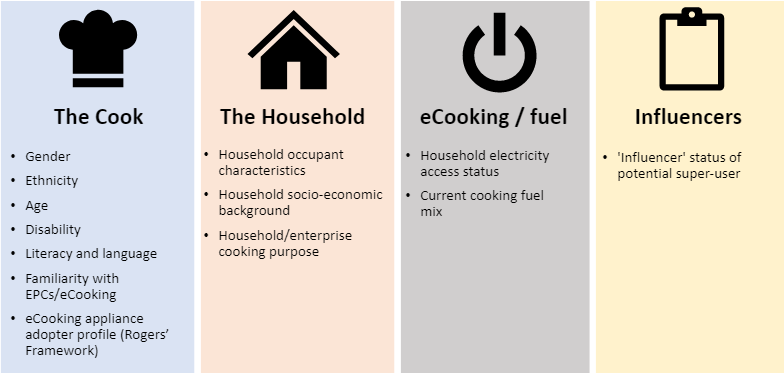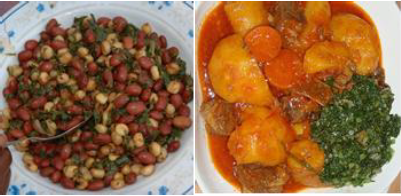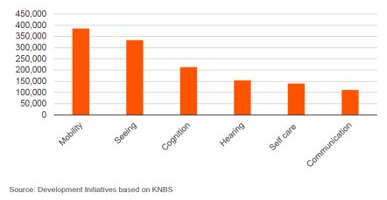- Date
- 31st July 2020
- Categories
By Dr Joni Cook & Dr Jon Leary (MECS team, Loughborough University).

In this latest piece of the Leave No-One Behind (LNOB) blog series, we discuss the thinking behind the integration of the LNOB agenda in the selection of super-users to conduct usability testing of electric cooking appliances as part of the Global LEAP Awards. This blog post discusses how the LNOB agenda was prioritised when formulating the super-user selection criteria – a subsequent blog in the series will reflect upon how this played out in practice. This will contribute to the development of a standard protocol for prioritising the LNOB agenda when selecting research participants across a range of MECS programme activities and country contexts.
Championing the Leave No-One Behind (LNOB) agenda, to eliminate group-based discrimination and to “reach the furthest behind first”, is imperative across all activities of the MECS programme. Here, we discuss prioritising LNOB principles in the formation of criteria for selecting super-users to conduct usability testing of electric cooking appliances as part of the Global LEAP Awards 2020.
The Global LEAP Awards is an international competition to identify and promote the world’s best energy-efficient appliances, accelerating market development and innovation. MECS identified Electric Pressure Cookers (EPCs) as one of the most energy-efficient cooking appliances on the market that is also highly compatible with local cooking practices in many of our focus countries. In 2020, the first Global LEAP competition for electric cooking appliances was launched, specifically focussing on EPCs. The scope of the Awards has been extended from its traditional off-grid focus to include underserved markets more broadly, which include off-grid, weak-grid and reliable grid connections. EPC models nominated for the competition will be assessed by laboratory and usability testing. The former evaluated the performance of EPCs in an objective, repeatable context, and the latter evaluates their effectiveness in meeting the needs and aspirations of cooks in high impact potential markets, in a subjective and culturally-specific context.
As part of the usability testing, 10 super-users based in Nairobi, Kenya, will be selected from a wider pool of 30 individuals to test a range of EPC models using a blend of home testing, controlled cooking tests (CCT) and a focus group. Prioritising LNOB principles in selecting the super-users will endeavour to “reach the furthest behind first” by identifying and promoting the needs and aspirations of underrepresented groups of every day cooks, such as persons with a range of disabilities, age profiles, ethnic and cultural backgrounds, through the ranking of the suitability of EPC models for market development. In the selection of super-users, it is not only essential that key market segments are represented, but that underrepresented users – groups that are typically left behind – are prioritised. The selection criteria that we have identified to satisfy these objectives are outlined in Fig. 1. Selection criteria are categorised according to those relating to the cook, the household, eCooking / fuel characteristics, and ‘influencer’ status.

We discuss the decision making behind three of the selection criteria below:
Gender
Of the 10 super-users, we aim to select 8 women and 2 men. Whilst a shift towards gender equity in household cooking is projected, women currently perform the majority of cooking in Kenyan households, hence representing the majority of our 10 super-users. However, it is important to include male super-users, as men are often responsible for household purchasing decisions, which can include cooking appliances, and therefore its important to capture male perspectives on different models of EPC.
Ethnicity
Ethnicity, including cultural and religious background, is also a key criterium for super-user selection. Over 70 distinct ethnic groups exist in Kenya, the top five most prevalent (2019 est.) being the Kikuyu (17%), the Luhya (14%), the Kalenjin (13%) and the Luo (11%). Cooking practices vary widely according to ethnic and cultural background (e.g. Fig. 2), therefore the ways in which these communities use an EPC for household cooking is likely to differ. We aim to select at least one super-user from the top five most prevalent ethnic groups and to include at least two super-users from each of the two main religious groups: Christians and Muslims.

Disability
Approximately 2% of the Kenyan population is classified as having a disability, however we aim to select a much higher proportion of super-users with disabilities: 50%. This is because there are many different types of disability, each with different needs. For example, an EPC with a loud buzzer that sounds when cooking has finished may be preferred by blind users, but will make little difference to deaf users. Specifically, we aim to target 4 people with disabilities and 1 expert in disability, who understands the requirements of people with different types of disabilities. We therefore aspire to “reach the furthest behind first” by including as broad a spectrum of disabilities as possible. To assess whether a person is classified as having a disability and to identify disability type, we will employ the standard approach of the Washington Group Questions on disability, a methodology used to disaggregate Sustainable Development Goal data by disability status. We aim to select super-users with as wide a range of the most frequently occurring disability categorisations as possible, with preference given to the most prevalent categories – mobility and sight issues (Figure 3). This will enable assessment of (i) the suitability of EPC models for meeting a the needs of people with different types of disability; (ii) an understanding of how cooking habits vary by disability type, and (iii) how EPC usability requirements compare between disabled and able bodied persons.

We acknowledge that this set of criteria for selecting super-users constitutes a ‘wish list’ of aspirational targets which will be virtually impossible to fully satisfy in practice, however we endeavour to meet as broad a range of criteria as possible in order to maximise inclusion of underrepresented groups. We also acknowledge the limitations of the selection process, due to the practical constraints, in particular due to Covid-19 restrictions. For example, we are unable to represent those who do not have access to electricity at home, as it would not be possible for them to carry out the home testing part of the programme.
We will reflect upon how applying these selection criteria fares in practice in a future blog once the super-user selection and Global LEAP usability testing have been completed.
Catch up on the MECS Field Methods Seminar where this blog was discussed below. The group meets fortnightly to discuss a range of different techniques for carrying out field research – to receive updates on future sessions, or access previous sessions, contact Jon Leary.